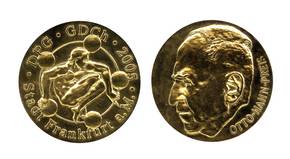


"The award serves to promote science, especially in the fields of chemistry,
Physics and applied engineering
through the recognition of outstanding scientific achievements.
This is also connected with the intention of making the responsibility of science for society clear. "
The Otto Hahn Prize is jointly awarded every two years by the City of Frankfurt a. M., the German Physical Society (DPG) and the German Chemical Society (GDCh). The GDCh works together with the other member societies of the German Central Committee for Chemistry (DZfCh).
The prize has been awarded since 2005 and is a merger of the former Otto Hahn Award of the City of Frankfurt, the Otto Hahn Award for physics and Chemistry of the DPG and the GDCh, which was established in 1953.
Alternately, renowned people from physics and chemistry are honored with the prize. It is endowed with ?50,000, half of which is financed by the City of Frankfurt and one quarter each by the participating companies. The award ceremony will take place in Frankfurt's Pauls-Kirche.




Professor Herbert Waldmann is being awarded the Otto Hahn Award for his groundbreaking achievements in the field of chemical biology and in particular his fundamental contributions to tumor research. As one of the co-founders of chemical biology, Herbert Waldmann is a leading scientist in this field. He specializes in the synthesis and investigation of proteins and in the development of concepts and methods for the synthesis of bioactive small molecules. Through his research, he has gained new insights into biological signal transmission, in particular the role of Ras GTPases, which play a significant role in many types of cancer. His work has helped to develop new approaches to the treatment of tumors with Ras mutations. Through the systematic synthesis of pseudonatural products, primarily through the use of an innovative synthesis platform, he has opened up a new source of pharmaceutical active ingredients. His interdisciplinary research has thus answered questions of particular social relevance.
| 2025 | Peter Hommelhoff, Munich/Erlangen | physics |
| 2023 | Herbert Waldmann, Dortmund | Chemistry |
| 2021 | Klaus Blaum, Heidelberg | physics |
| 2019 | Martin Jansen, Stuttgart | Chemistry |
| 2017 | Karsten Danzmann, Hanover | physics |
| 2015 | Jürgen Troe, Göttingen | Chemistry |
| 2013 | Ferenc Krausz, Munich | physics (Nobel Prize in physics 2023) |
| 2011 | Manfred Reetz, Mülheim an der Ruhr and Marburg | Chemistry |
| 2009 | Stefan Hell, Göttingen | physics (Nobel Prize in Chemistry 2014) |
| 2007 | Gerhard Ertl, Berlin | Chemistry (Nobel Prize in Chemistry 2007) |
| 2005 | Theodor W. Hänsch, Munich | physics (Nobel Prize in physics 2005) |
| 2003 | Helmut Schwarz, Berlin |
| 2000 | Hans Christoph Wolf, Stuttgart |
| 1998 | Dieter Oesterheit, Martinsried |
| 1989 | Rudolf Hoppe, Gießen |
| 1986 | Heinz Maier-Leibnitz, Munich |
| 1979 | Rolf Huisgen, Munich |
| 1974 | Friedrich Hund, Göttingen |
| 1967 | Georg Wittig, Heidelberg |
| 1965 | Erich Hückel, Marburg |
| 1962 | Manfred Eigen, Göttingen |
| 1959 | Hans Meerwein, Marburg |
| 1955 |
Lise Meitner, Stockholm/Sweden Heinrich Wieland, Starnberg |
The awardee are selected by an eight-member board of trustees. Four members belong to the city of Frankfurt (mayor, head of the city council, head of cultural affairs, university president) and two each appoint the boards of GDCh and DPG.
A selection committee prepares a proposal for the Board of Trustees in advance:
Prof. Dr. Barbara Albert, University of Duisburg-Essen (board of trustees, lead management)
Prof. Dr. Joachim Sauer, Humboldt University of Berlin (Board of Trustees)
Prof. Dr. Benjamin List, MPI for Coal Research, Mülheim ad Ruhr
Prof. Dr. Frank Glorius, Westphalian Wilhelms University
Prof. Dr. Ralf Ludwig, University of Rostock
Prof. Dr. Maria Wächtler, Technical University of Kaiserslautern
This page has been machine translated. If you have any feedback or comments please feel free to contact us. 
last modified: 23.10.2025 17:29 H from Translator